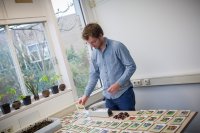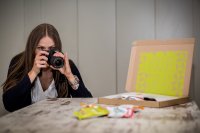Photo’s:
Sven Menschel.
Sanne is taking a photo of a boxful of healthy snacks. Sander is packing seeds for posting and Jacob is taking a little timeout in an armchair, eyes closed and earplugs in. We are at the StartHub, a building with 20 small offices and a communal space where the companies of students and fresh graduates can get off the ground. Companies with names like Bio Innovations, BoxBites, Quente and OnsZaden.
‘You reinforce each other here,’ says Master’s student Thomas van den Boezem, talking about his reasons for joining StartHub. He was in at the start of BoxBites, a company that puts together healthy snack selections and was the first resident of StartHub one year ago. ‘Now I help StartHub with arranging the programming and I help students find their way around.’
Thomas has loads of plans for new businesses or for expanding existing businesses. ‘Once you get the StartHub bug, there is no stopping it. My ideas generator is always switched on.’ Not that all of his innovative ideas lead to profitable new businesses. One of StartHub’s big plusses is precisely the way it enables starters to learn to evaluate their ideas well, says Thomas. ‘Is it feasible, workable affordable? At least 90 percent of the ideas are never put into practice, perhaps because they already exist or just because you never get round to them.’

Sander Onsman, owner of the seed company OnsZaden: ‘It is nice to have some sort-of colleagues.’
Success story
‘It is nice to have some sort-of colleagues,’ says Sander Onsman, carrying on packing seeds. He is the owner of OnsZaden, a company that sells seeds of tropical garden and houseplants. ‘You can link up with others. Because entrepreneurship is a continuous quest, he says. ‘Who are your clients? What is your approach?’ StartHub does not have readymade answers to these questions, but can offer support and help.
Besides their fellow-entrepreneurs, help can be obtained from ‘incubation manager’ Jannet de Jong. She shows us the communal space, a kind of village square for everyone involved in StartHub. Workshops are held here every three weeks, on topics such as negotiation skills or drawing up a business plan.
This evening there is a presentation by United Wardrobe. This is a success story about Wageningen students who set up a flourishing online secondhand clothing shop. All those curious about their approach – their ‘secret’ – are welcome to come along and listen. ‘Everything is very low-threshold,’ says De Jong. ‘We want students to drop in and to know where we are. We want them to think: that building there at the end of the campus, that is entrepreneurship.’
Getting startup companies out of their attic rooms and giving them more opportunities: that is StartHub’s mission in a nutshell, says De Jong. ‘It’s not easy to do it all on your own. Look for a partner, is our advice. That might be the most important thing I do: linking people up with each other. Someone might be looking for a partner with a truck, for instance, or for a marine biology specialist.’ StartHub is also keen for people to work ‘open source’. ‘Not to keep everything to yourself but to involve other people in the process.’
All equal

Sanne Vreede of BoxBites: ‘The TV programme Goede Tijden Slechte Tijden called recently, wanting the snacks as morale boosters for the actors.’
Sanne Vreede tries out another perspective for the photo of the BoxBites snacks. After she graduated from Avans Hogeschool in Breda she wanted to do something related to healthy eating habits and she heard about a young company. ‘Could you by any chance use someone for the marketing?’ she asked the entrepreneurs, just the two of them at that point.
‘We are a very flexible small company,’ she says. ‘All we really need is a place for storage and packing.’ That place is the StartHub. Sanne is there every day from 9 to 5 and she loves it. ‘A nice atmosphere with young people.’ All of them embarking on similar adventures. ‘We are all equal. It felt like becoming part of a family.’
In StartHub we are all embarking on similar adventures
Sanne Vreede
And the orders are coming in, she says. The boxes full of goodies like fruit and nut bars which make it easier to snack healthily are obviously appealing. ‘The RTL programme Goede Tijden Slechte Tijden called recently. They wanted the snacks as a morale booster for the actors.’
StartHub’s first year
 StartHub Wageningen celebrates its first birthday on 18 November. This student incubator at Wageningen UR offers space, coaching, training, financial advice and above all, a network of enterprising students and alumni (up to three years after graduation). Six young companies are already renting a room in the building opposite Vitae (Rikilt)
StartHub Wageningen celebrates its first birthday on 18 November. This student incubator at Wageningen UR offers space, coaching, training, financial advice and above all, a network of enterprising students and alumni (up to three years after graduation). Six young companies are already renting a room in the building opposite Vitae (Rikilt)
. And there are four partners involved, including a technical laboratory and a financial advisor.
StartHub also has members, 70 at present, who pay 15 euros a year and can then participate in workshops, use a hot desk or talk to a business coach. You don’t have to have an idea for a business, just an interest in entrepreneurship.
Since 2009 Wageningen has also housed a general ‘incubator’ for starting entrepreneurs: StartLife. Participants do not necessarily have to have a link with Wageningen University, although it is fine if they do. Of the 120 starters the foundation has helped, 30 were WU students.
Making mistakes
Jacob Paul Bussmann, who is emerging from his armchair, is in another stage of the startup process. He is setting up a business related to the social impact of climate change, which will soon take him to South Africa. He is preparing a pitch to get a loan. ‘And I talk to everybody here. We give each other feedback on ideas.’ Because that is what goes on here: exchanging information, brainstorming, asking critical questions. Jacob: ‘There is a businesslike, entrepreneurial atmosphere and yet it is calm and peaceful. It’s the perfect workplace for me. The most important thing, perhaps, is that you have all sorts of people here who are moving in the same direction, single-minded people. That generates energy. You learn from successes and from mistakes. Both your own and other people’s.’
‘You don’t suddenly turn into Bill Gates, you need to realize that,’ says incubation manager De Jong. ‘Starting up a business often means making lots of mistakes. And then picking yourself up and carrying on. That is a business skill in itself.’
